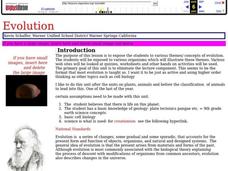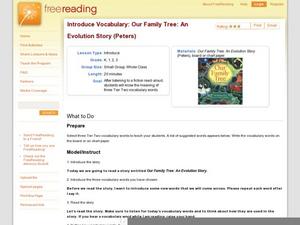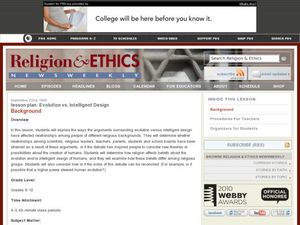Howard Hughes Medical Institute
Got Lactase? The Co-Evolution of Genes and Culture
Does the human body evolve as quickly as human culture? With a stellar 15-minute video, explore the trait of lactose intolerance. Only about 1/3 of human adults seem to still have the enzyme lactase and therefore, the ability to digest...
Curated OER
Evolution and the Fossil Record
Engage young biologists with four laboratory activities that explore the fossil record. Learners examine fossil images, a fossil kit, the rock record, and geologic time scale. They even experiment with the oxygen production of an Elodea...
Curated OER
Beans, Beaks and Bears
Students explore evolution. After watching a video on evolution, students perform a variety of experiments using beans which illustrate the concept of evolution.
Curated OER
Evolution
Explore the concept of evolution and cell biology; your class can work in groups to use the internet to view websites on evolution, take a quiz, and complete a lab activity.
Howard Hughes Medical Institute
The Making of the Fittest: Got Lactase? The Co-evolution of Genes and Culture
Got milk? Only two cultures have had it long enough to develop the tolerance of lactose as an adult. Learn how the responsible genes evolved along with the cultures that have been consuming milk. This rich film is supplied with a few...
Curated OER
Human Evolution: Biology, Bones
Learners will love a weeks worth of bone study. They use bones and characteristics of bones to explore the evolution of hominoids. Bones are compared, categorized, and considered. A great way to bring physical anthropology and material...
Curated OER
Introduce Vocabulary: Our Family Tree: An Evolution Story (Peters)
Lisa Peters presents macroevolution as a large-scale family tree in her book Our Family Tree: An Evolution Story. She suggests the process from single-celled organisms to modern-day humans, and learners explore new vocabulary through the...
Cornell Lab of Ornithology
Jump, Glide, or Fly? Exploring Bird Evolution
How have birds evolved from prehistoric animals? With the three-part lesson plan, small groups first research different prehistoric animals and determine whether they are birds. Then, scholars explore different bird adaptations using the...
Serendip
Evolution and Adaptations
Survival of the fittest isn't just for the movies! A five-part lesson explores several different species with known adaptations and analyzes them for their survival strategies. Using both video and research data, scholars draw...
Curated OER
Exploring Arthurian Legend
High schoolers investigate the evolution of the King Arthur stories and analyze them as a window into the culture that preserved them. They trace the legends through their earliest versions through medieval and Victorian times and into...
Curated OER
Why Does Evolution Matter Now?
Students are shown why they should care about evolution. They become specialists in one sphere influenced by evolution and then share their findings with their group. Students are lead into a class discussion, so that each student can...
Curated OER
How Does Evolution Work?
High schoolers investigate how natural selection influences evolution. They complete a hands-on lab simulation of natural selection, and replicate a real experiment and examine the interplay between selection factors in a population of...
Curated OER
Replacing Missing Links in the Evolutionary Chain
Examine the evolution of various species of hominids from their earliest existence approximately 4.5 million years ago to today. In small groups, learners research one of the ten stages of hominid evolution and then create a poster and...
Curated OER
Comparing Theories: Lamarck and Darwin
Learners compare the evolution theories of Lamarck and Darwin. They use self-assessment and a video to increase their knowledge of evolution theories. They research questions and present them to the class.
Curated OER
The Effect of Natural Selection on Genes, Traits and Individuals
Rotating through five stations, evolutionary biologists explore the question of how changes in DNA facilitate the changes in a population over time. High-quality, colorful cards of animals, skeletons, skulls, and DNA sequences can all be...
Howard Hughes Medical Institute
The Making of the Fittest: The Birth and Death of Genes
Adaptations must be made as environments change. This fabulous presentation features Icelandic icefish, a transparent, scaleless specimen that even has colorless blood. Genetics and adaptations concepts are explored as scientists study...
Curated OER
Exploring Learned and Innate Behavior
Learners explore the differences between learned and innate behavior among humans and monkeys. They complete an assignment and read articles about two studies, which used similar test methods to show that infants and monkeys share an...
Curated OER
Introduction to Adaptation
Tenth graders observe collections of specimens and discuss their answers to provided questions. They explore common ancestry, homology, analogy, adaptive radiation, and evolution, while formulating creative answers based on their...
Howard Hughes Medical Institute
Survival of the Fittest - Variations in the Clam Species Clamys sweetus
It's not often that you come across a clever laboratory activity that is both imaginative and comprehensive! Using M&M's and Reese's peanut butter candies to represent two different clam species, young biologists test for "relative...
Curated OER
The Emergence and Evolution of the Cuneiform Writing System in Ancient Mesopotamia
Students explore the parallel development and increasing complexity of writing and the growth of civilization in the Tigris and Euphrates valleys in ancient Mesopotamia.
Curated OER
Evolution vs. Intelligent Design
Ninth graders explore the arguments surrounding evolution versus intelligent design have affected relationships among people of different religious backgrounds. In this ethics lesson plan, 9th graders determine whether relationships...
Curated OER
Why Is Evolution Controversial?
Students explore why evolution has always been a controversial topic. They use scientific process to determine patterns and to critically analyze alternative explanations for natural phenomena.
Curated OER
The Fossil Evidence for Evolution
Students explore how scientists use fossils to explore how various species have evolved over time. In this fossil lesson plan students study how to date fossils.
Curated OER
How Does Evolution Work?
Students pretend they are a scientist like John Endler in this Web activity. They visit his pools, from hypotheses, and test them out. In the process, the explore about natural selection and sexual selection. They are able to explain the...

























